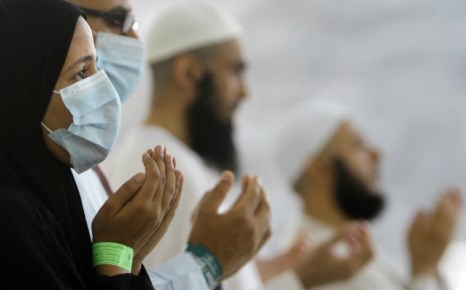Ebola
In an effort to prevent pilgrims from contracting Ebola, the hemorrhaging fever which has killed at least 3,338 in West Africa, Saudi Arabian officials denied visas to 7,400 Muslims from Sierra Leone, Guinea, and Liberia. As an added precautions, pilgrims have been asked to fill out medical screening cards detailing their travels over the last three weeks, since it can take up to 21 days for someone who has come down with Ebola to show symptoms.
The problem is that some might fall into the period of time when they have come into contact with the disease, but not yet exhibited cause to seek medical attention. That’s what appears to have happened with the man who flew from Liberia to Dallas earlier this week.
Another possible threat comes from the roughly 76,000 Nigerian Muslims who will be making the pilgrimage. While the country has effectively contained the spread of Ebola, some could still have the disease in a dormant state.
David Heymann, an expert on the disease based at the London School of Hygiene and Tropical Medicine told the International Business Times, “Nigeria has done quite a good job it appears, but nothing will be clear until they have gone 21 or even 42 days without a case. But right now they haven’t found any more cases and hopefully that will continue.”
“But fortunately,” he said, “It is not spread through the air, but through very close contact with a sick person – and then only by the blood or by close contact with infected body secretions.”
Polio
Another threat posed to pilgrims is that of contracting polio, a disease which has been wiped out of all but three countries — Pakistan, Afghanistan, and Nigeria. Each country sends tens of thousands of pilgrims to the Hajj each year.
Pakistan, which has the second highest population of Muslims in the world, also charts the highest number of polio cases in the world – a number that may hit a new record high before this year is over.
Rana Muhammad Safdar, of the Pakistan National Institute of Health told AFP, “The number of polio cases, recorded this year has reached 187 and if it reaches 200, we will cross our own record of 199 in year 2000.”
The fear among some Muslims that polio vaccination drops are part of a plot by Western states to sterilize them plus the part of an immunization worker in tracking Osama bin Laden in Pakistan have not made containing the debilitating disease any easier.
As a precaution Saudi health officials doled out polio vaccines to thousands of pilgrims upon entry to the Kingdom. Abdul Ghani Mohamed Al-Malki who heads the health team at the main airport in Jeddah said that of the half million pilgrims his team screened, “More than 172000 pilgrims were given polio doses while almost half a million were given vaccines against meningitis and more than 88000 underwent medical treatment for various ailments.”
Since polio is spread through feces, a major part of containing its spread at Hajj this year as in the past will depend on the availability of proper sanitation, an area that hasn’t been handled perfectly in the past.
MERS
One disease that pilgrims that is already rampant in the region is MERS, or the Middle Eastern Respiratory Syndrome coronavirus. The World Health Organization reported this week that the tally of confirmed MERS cases numbers at 853, with just over 300 deaths tied to the virus. The vast majority of these deaths have occurred in Saudi Arabia, which has admitted to delays in reporting and miscommunication that have allowed the virus to spread. Some scientists have said that the data published by Saudi Arabia has not been comprehensive enough to allow them to research the disease which was only identified two years ago.
“With growing evidence indicating the role of camels in transmitting MERS-CoV to humans, we’re advising all travelers to the Middle East, particularly those with underlying or chronic medical conditions, to avoid contact with camels and camel products, and to practice good hand and respiratory hygiene to reduce the risk of respiratory illnesses.” Nick Phin, head of respiratory diseases at PHE, told the International Business Times.
He added that pilgrims who show symptoms of fever, cough, or shortness of breath within two weeks after their return from the Middle East should see their doctors and inform them of their travels. MERS is spread through close contact with someone who’s been affected — someone who may never show symptoms — so pilgrims packed into prayer halls may be at risk of contracting the virus.
These global public health concerns don’t seem to have kept many from taking part in the momentous religious journey. Some pilgrims, however, are taking extra precautions this year, with many donning blue surgical face masks — a stark look over the white robes pilgrims to Mecca generally wear.
The hajj will conclude this weekend, but it’ll be weeks before the public health impact of this mass gathering of people is felt.
More about:















































